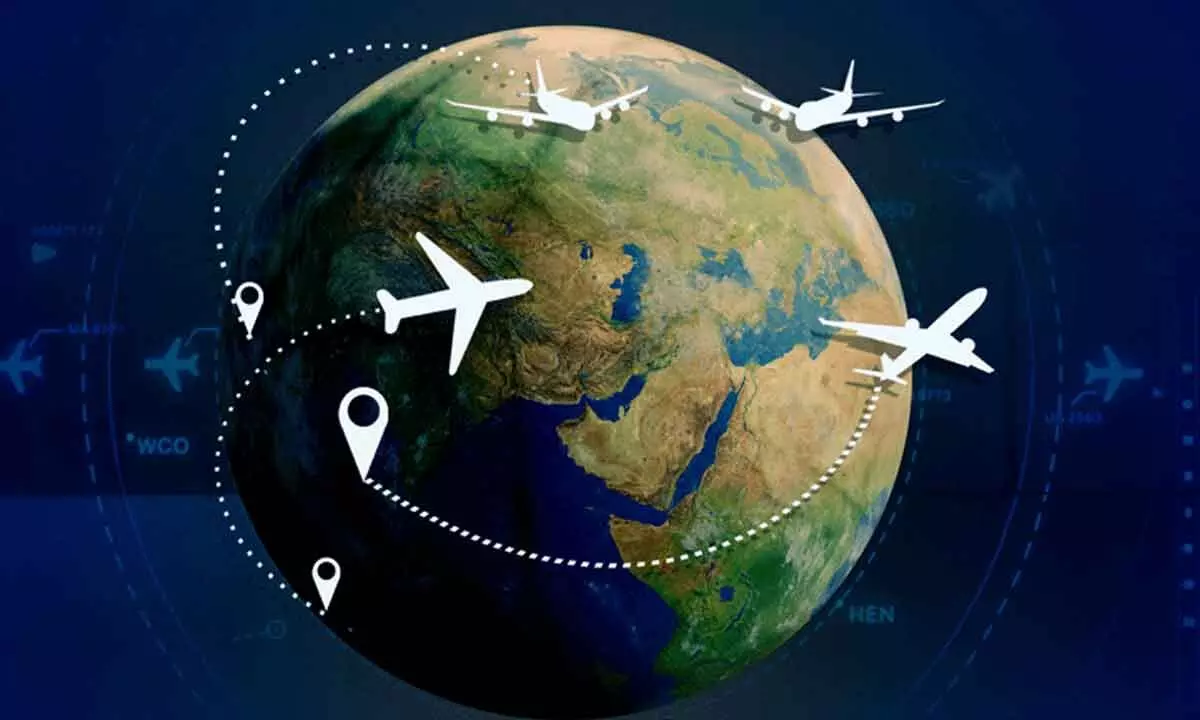Improving travel experience to get the competitive edge
International passenger traffic is forecast to approach the four billion mark this year
image for illustrative purpose

Since most board with a smartphone, tablet or laptop in hand, a key expectation is for a superior online connection in the air. Studies indicate that 21 percent of travelers have already abandoned their preferred airline for an option with better in-flight Wi-Fi
By the end of 2024, global passenger traffic is expected to reach 9.7 billion, surpassing the 2019 level for the first time since the Covid-19 pandemic.
Global passenger traffic is projected to grow at a compound annual growth rate (CAGR) of 4.3% from 2023 to 2042, and 3.6% from 2023 to 2052.
Global passenger numbers are forecast to approximately double from 2024 to 2042 and to be 2.5 times higher in 2052.
Recovery in 2023 and 2024 will be led by the international passenger market, which is expected to grow by 14% in 2024, while domestic passenger traffic is projected to increase by 10% in 2024.
By 2024, international passenger traffic is forecast to approach the four billion mark, with domestic passenger traffic reaching 5.7 billion. Looking ahead to 2042, international passenger traffic is expected to reach 8.7 billion and domestic passenger traffic to attain 10.6 billion.
Aircraft movements are expected to reach 98.2 million in 2023 and 106.7 million in 2024. Airports worldwide will see 178.1 million aircraft movements by 2042, and 209.2 million by 2052.
With the surge in travel passenger expectations are creating an ultracompetitive aviation landscape, making airlines scramble to provide the best in-flight experience that will lure passengers to their aircraft seats.
Enhance convenience with value-added services: Value-added services enable you to increase passenger convenience before, during, and after their airport experience.
You can integrate pre-book parking solutions, enabling travellers to reserve their parking spots ahead of time.
Airports can be busy, and let’s be honest — no one enjoys queuing. A global survey of over 7,000 passengers reported that 40% of leisure travellers want shorter queues, while 45% want faster airport security checks.
Value-added ancillary services like virtual queuing and security fast track tickets can make queues a thing of the past.
You can offer virtual queuing anywhere a queue would typically exist, such as airline check-in, airport lounges, or security lines. Customers select a time of arrival, get sent an e-ticket to their mobile, and when their time arrives, they can use the e-ticket to pass through the airport without waiting in queue.
Security fast track: Once a passenger has booked a fast-track ticket via your airport website, they can enter a separate fast track lane at security screening and pass through with their e-ticket.
In the past, a low fare or brand familiarity could almost guarantee loyalty. Today, online ticket sales are keeping most fares competitive – making it easier for modern travelers to demand more before they choose a carrier.
Here are three ways passenger expectations are setting a new standard for the experience they want in the air:
Customers are willing to pay for what they want. Research confirms what flyers want is a great customer experience, and 86 per cent are willing to pay more for the services that are most meaningful for them. Businesses that are slow to adjust to those expectations face the prospect of customers leaving. That’s why a great customer experience ranks highly as a brand differentiator, and paying a premium isn’t seen as a deal breaker.
Customers want better Wi-Fi. Fewer and fewer travelers are willing to leave a great internet speed and quality connection behind when they take to the skies. In fact, 84 per cent say it’s important to have an experience identical to what they enjoy at home or at the office. Airlines ignoring passengers’ expectations for Wi-Fi speed and convenience do so at their own risk. Our Honeywell survey indicates that 68 per cent of travellers book their flights based on Wi-Fi availability. And a whopping 90 per cent told us it’s essential to experience a reliable, fast connection throughout their flight, no matter where they’re flying in the world.
Customers are willing to flip to other carriers. It’s true that passengers will leave their preferred airline if they can get the experience they want elsewhere. Since most board with a smartphone, tablet or laptop in hand, a key expectation is for a superior online connection in the air. Studies indicate that 21 percent of travelers have already abandoned their preferred airline for an option with better in-flight Wi-Fi. Another 45 percent say they would not remain loyal to their preferred airlines if they knew it didn’t provide the best Wi-Fi. The figures are particularly telling for the large, emerging market of millennial (born 1982-1998) travellers, with 89 percent considering a fast Wi-Fi connection critical to streaming content in-flight.
Airline passengers’ shifting expectations make brand loyalty tougher to capture. But those who get the customer experience right just may find their customers reward them in a big way through repeat business and by sharing the good news with others.

